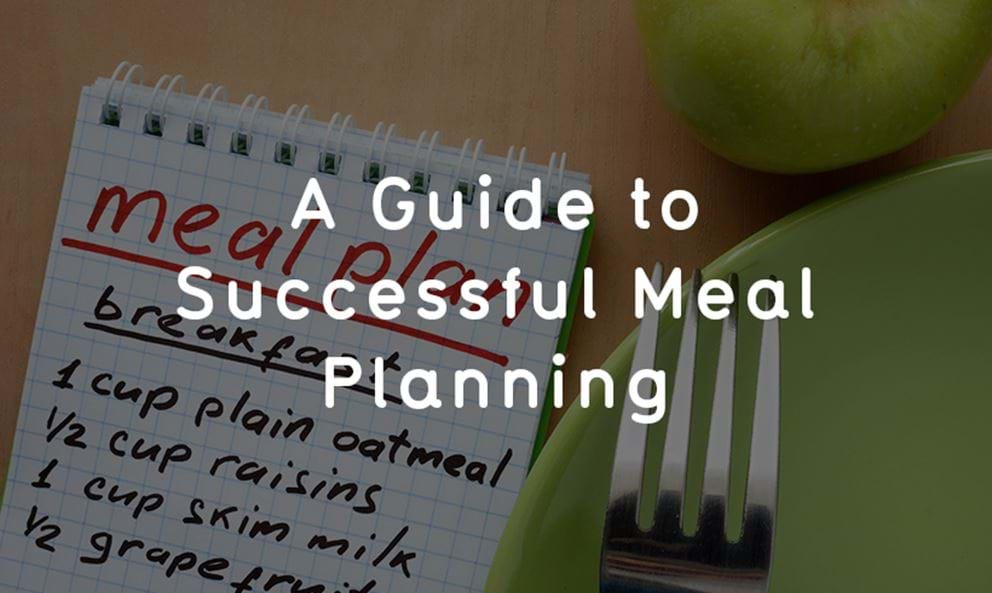A Guide to Successful Meal Planning

Meal planning is far and away one of the best ways of ensuring you meet your overall health and fitness goals. As the old saying goes, “you can’t out-train a bad diet,” and what you put in your body will have a direct and measurable impact on the kind of results you can expect to achieve in the gym, not to mention the way you’ll look and feel on a daily basis.
But, of course, meal planning can be daunting, especially if you’re new to the game. Here’s a look at some steps you can take to give you the edge in staying on target with your meal planning goals and having a good time doing.
Plan the whole week in advance over the weekend
The week is a pretty hectic time. Between work, family, day-to-day chores and other commitments you’d be hard pressed to find the time to properly plan your meals for even the following day, without getting jaded and resorting to a series of shortcuts before long. Never mind for the rest of the week.
Say you’ve had a difficult Monday in the office, have had to juggle other commitments once you get home, and then, just as you were considering heading to bed and falling into blissful slumber, you remember that you’ve got to work out Tuesday’s meal plan. Would you be likely to put a lot of care and effort into it?
Avoid this mess by scheduling a time each weekend to put together your meal plan for the following week. Once you’ve practiced doing this for a few weeks, the whole process will become faster and more streamlined, as you’re able to recycle old, tested recipes rather than trying new things from scratch.
Keep it varied
They say variety is the spice of life, and that’s as true for your diet as for anything else. For one thing, studies have shown that a more varied diet is simply better for your health, and may reduce type 2 diabetes risk by a whopping 30%.[1]
But health benefits aside, life’s just more exciting when you’re not eating oatmeal, boiled chicken, and kale for every meal.
A large part of the key to success with any diet is just staying engaged and making your diet an enjoyable lifestyle shift, rather than a chore. Take the extra time needed to plan different meals for each day of the week.
There are two main non-health related benefits to this: firstly, you’ll feel good. Secondly, you’ll quickly be able to cycle through different recipe types, learn what you enjoy, and what you’d rather avoid in future.
Calculate and track the calories and macronutrient content of each meal
One of the key benefits of planning your meals is that you’re able to work out just how many calories, and what proportion of the three macronutrients – protein, carbohydrates, and fats – you’ll be getting in your diet.
Calorie and nutrient tracking is a very important habit to develop whatever your fitness goals, as any muscle building effort will require a caloric surplus (as well as enough protein), and any major weight loss mission will require a caloric deficit.
Tracking the nutritional content of your meals in this way also allows you to tweak your overall diet structure without stressing over every meal in the heat of the moment. A ketogenic diet, for example, will require high fat and low carb intake. If the urge seizes you to try keto for a week or two, you’ll know exactly what to tweak and how much it will affect your normal routine.
Planning your meals to match your daily caloric and macronutrient goals in advance is also a great defence against over or undereating, as you’ll begin each day knowing just what, and how much, you should be eating.
Planning your meals like this also allows you to go back to the drawing board with a big picture overview if you find you aren’t meeting your overall fitness goals after a while. Still not gaining weight? Tweak your meal plan here and there, adding in some extra calories and protein. Not losing weight fast enough? Do the same thing, but this time shave a couple of hundred calories off your daily total.
Include a cheat meal or day
Even the most varied, interesting meal plan can benefit from the occasional wildcard here or there. That’s where the cheat meal – or even an entire cheat day – comes in.
The idea behind a cheat meal or cheat day is that you’ll eat things which aren’t normally allowed on your diet, as a way of reducing temptation during the week, and keeping you satisfied and committed to the meal plan for longer.
It also has social benefits. If all your non-meal-planning friends are going out for pizza on the weekend, it can be frustrating having to be the one who sits there grimly staring at your salad.
There are two main approaches to a cheat meal or day. One is an “anything goes” policy, where you leave the day open and unplanned and just eat whatever you feel like. The other is a controlled cheat, where you’ll have certain dietary targets to stick to – such as an overall calorie limit, or certain restrictions like “I can have a hamburger, but no chocolate or cake.”
The option you go with will depend a lot on your individual goals and how your body responds to the cheat. If you gain weight easily, a full day, unrestricted calorie binge could hurt your weight loss progress.
On the other hand, if you’re a “hard-gainer” trying to pack on slabs of muscle, stuffing your face for one day likely won’t be as harmful. In fact, you could even use it to help your overall goals, such as by turning it into a “carb refeed” day to help replenish your muscle glycogen stores before hitting the squat rack the next day.
[1] http://journals.plos.org/plosmedicine/article?id=10.1371/journal.pmed.1002085


